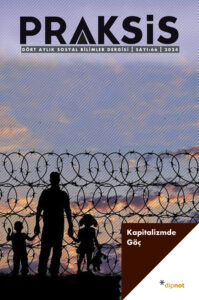| Editors | Coşku Çelik, Ecehan Balta, Ezgi Doğru |
| Publication Secretary | Ümit Özger |
| Issue Editors | Demet Özmen Yılmaz, Koray Yılmaz, Umut Ulukan |
Political Economy of Migration
Sungur Savran
This article was first written in English and published in the following book: Erol Balkan & Zümray Kutlu Tonak (eds.), Refugees on the Move. Crisis and Response in Turkey and Europe, New York: Bergahn Books, 2022. Translated into Turkish by the author himself for publication in Praksis.
Refugeehood As A Relation And Process: A Historical Materialist Discussion On The Syrian Refugees
Cenk Saraçoğlu
Abstract:
Refugees are transformed into laborers within the confines of displacement and asylum, becoming integrated into production processes under these unique conditions. The social reproduction of the distinctive labor regime they endure necessitates the engagement of specific mechanisms, processes, and actors that do not apply to other segments of the working class. A thorough analysis of these processes—dispossession, proleterianization, exploitation, and reproduction—entails a nuanced understanding of the refugee experience within the overarching structure, contradictions, and dynamics of the capitalist social order. This article aims to present an epistemological framework that facilitates a comprehensive evaluation of Turkey’s encounter with Syrian refugee migration, rooted in historical materialist analysis. Initially, the article will delineate certain epistemological premises and methodological approaches that a historical materialist perspective might employ in addressing contemporary refugee issues. Subsequently, it will reinterpret the principal problem areas identified in academic research on Syrian refugees in Turkey, weaving them together from a class perspective based on these foundational premises.
Keywords: forced migration, refugees, dispossession, class, surplus population, historical materialism, reproduction
Capitalism, Migrant Workers and Trade Unions
Miriş Meryem Kurtulmuş
Abstract
In this study, we discuss migration and immigrant labour in terms of the role they play in the context of capitalist production relations. Since the beginning of capitalism, immigrants have been a part of the formation of the working class, the reserve army of labour, and therefore the competition between workers, and the efforts to eliminate this competition and act together. In this context, first of all, we will critically evaluate the policies, strategies, and practices developed by trade unions for migrant workers within the framework of studies in the world literature. Afterwards, we will reveal whether trade unions and confederations in Turkey have policies, strategies and practices toward migrant workers based on a few field research done previously in the literature. Finally, the possibilities of trade unions to organize migrant workers in the context of capitalism and migration in today’s historical conditions will be discussed.
Keywords: Industrial reserve army, surplus population, migrant workers, trade unions, Turkey
Sharing the Tea: Migration Dynamics and Sharecropping in the Eastern Black Sea Region
Umut Ulukan ve Nihan Ciğerci Ulukan
Abstract
Migration plays an important role in reshaping social structures in rural areas. Rural areas have traditionally been seen as sources of out-migration rather than areas that attract migrants. However, in recent years, it has been observed that rural areas also receive migration and academic attention has been directed towards labour migration in rural areas. On the other hand, one of the main reasons why rural households migrate is the poverty caused by the neoliberal transformation in agriculture. Rural households diversify their income to produce new livelihood strategies and they are engaging in non-farm activities along with farming. Thus, while rural-urban and rural-rural migration continues, some of the households have retained their land, but the continuation of agricultural production has been possible only by diversifying the labour within the household and some of the household members working in non-agricultural jobs. This is also observed among tea producers in the Eastern Black Sea region, which is the focus of our study. Migration from the region and the shift of some family members to non-agricultural sectors have caused a labour shortage. This labour shortage is filled by migrant and local sharecroppers. In this study, the migration processes of migrant sharecroppers, unpaid household labour in sharecropping, gendered division of labour, labour control, indebtedness, accumulation and the dynamics of differentiation are examined. As a result, it has been revealed that migrant sharecroppers have a differentiated structure among themselves rather than a homogenous group. It was also found that landowners prefer sharecropping to reduce labour costs and to access unpaid household labour, especially women and children.
Keywords: Internal Migration, Eastern Black Sea, Sharecropping, Agrarian Change, Tea Farming
Ways of Articulation of Social Assistance with Labour Migration in Turkey: Adjustment and Immobilization Effect
Denizcan Kutlu
Abstract
This study questions the field of relations between residence, migration-based mobility of labor and social assistance and aims to open a discussion on the effects of social assistance on the work-centered migration decision in Turkey. Our observations, based on field researchs previously completed by us, that social assistance has some effects on households’ continuity of residence, were decisive in opening this discussion. In the study, the way social assistance is articulated with labour migration is discussed under two headings. Firstly, the post-migration adjustment effect of social assistance was mentioned. This issue has been brought to the agenda in terms of the transformation of the welfare regime in Turkey. Secondly, it focused on the potential effects of social assistance on location decision of labour. This subject is based on the characteristics of the institutionalization and implementation of social assistance in Turkey, as well as the facts that are included in the literature and that the author has observed in different field studies, such as the settlement of the poor, their immobilization, and the slowing down of the tendency for internal migration. There are two issues that the study aims to point out theoretically. In order to create stronger ties with the basic approach of the study, the tendency to fall into a contradictory position of the state in Turkey through the social assistance policies and practices in terms of formation of capitalist accumulation and labor force, is an issue waiting to be examined theoretically and factually. The other issue is the importance of the situations such as geographical mobility, dynamism, settlement, immobilization, introversion, etc. that the poor fall into, based on their material life experience, together with social assistance, in terms of class formation, relations and struggle. It has only been pointed out these issues and an attempt has been made to create a theoretical basis for the answers to the research question posed.
Keywords: Labour migration, social assistance, poverty, internal migration, location decision of labour
The Role of Immigrant Labour in Integrating Into Global Capitalism Through the Waste Industry
Ebru Başgül
Abstract
The solution to the ecological and social damage caused by the historical functioning of capital accumulation in the capitalist production system has been found in the setting of new areas of accumulation. One of the areas which serves as a model for this today is the waste industry. The plastic industry in Western capitalism was established at the beginning of the 20th century with the promise of producing alternative materials against the danger of depletion of natural resources caused by industrial production. The waste industry on the other hand was founded in the 1970s, when the capital accumulation crisis was experienced, in order to solve the waste management problems created by the plastic industry. In the 1980s, while capitalism was being restructured, both industries shifted the material part of their production to late capitalist countries and were effective in transforming these geographies, especially South Asian countries, into plastic processing areas in the capitalist division of labour. This industrialization process, which also triggers the migration phenomenon, has transformed areas known for their craft production activities in the past into “plastic recycling villages”.
A similar trend is also visible in Turkey, with the increase in the number of small-medium scale waste processing facilities and the increase in plastic waste imports in recent years. The global operation of the industry in late capitalist countries such as Turkey is based on plastic waste which has low added-value and labour-intensive activities are predominant in its collection and processing. In this study, it is claimed that waste management in Turkey is a new area of accumulation and that recycling activity and the waste industry offer a new style of integration into global capitalism. In this process, the visibility of unregistered and precarious immigrant labour gradually increasing. Based on this, the study proposes to discuss the role of the waste industry in Turkey’s integration into global capitalism with the phenomenon of immigration. The capitalization of water management and its role in the capitalist international division of labour are discussed with the labour regime and immigration policies.
Keywords: Waste Industry, Immigrant Labour, Capital Accumulation, Plastic Waste, International Capitalist Division of Labour
Migrant Women’s Domestic Labour and the Role of Intermediaries: Sub-Saharan African Migrant Women in the Gulf States and Türkiye
Emel Coşkun
Abstract
This paper analyses the role of intermediaries in the migration processes of sub-Saharan African migrant women in Turkey with a reference to the Kafala System in the Gulf States. Based on a series of studies with Sub-Saharan African migrant women in Türkiye, the paper discusses the dynamics through which migrant women’s migration and working conditions are shaped with reference to Social Network Theory and compares it with the Kafala System in the Gulf States. The paper suggests that the growing demand for sub-Saharan African migrant women’s labour in domestic services is linked to their low status in the ethnic hierarchy and their vulnerable and easily exploitable position among migrants. The demand for migrant women’s labour is increasing in the context of the changing international division of labour in production and reproduction that is taking place in parallel with capitalist globalisation and the declining welfare provision of states. It can be argued that there is a certain type of women who are ready to migrate because of negative effects of neoliberal economic policies and unequal gender relations. The migration of sub-Saharan African women, most of whom migrate after becoming heads of household, can take place through intermediaries and institutionalised social networks. Access to and control over migrant women’s labour, which the state delegates to intermediaries through formal or informal means, shapes the harsh working conditions of migrant domestic workers. Urgent action is needed to support migrant women’s access to decent work and live conditions such as easy access to formal employment, social protection and information.
Keywords: Migrant women’s labour, gender, domestic services, Kafala System, Sub-Saharan African women.



